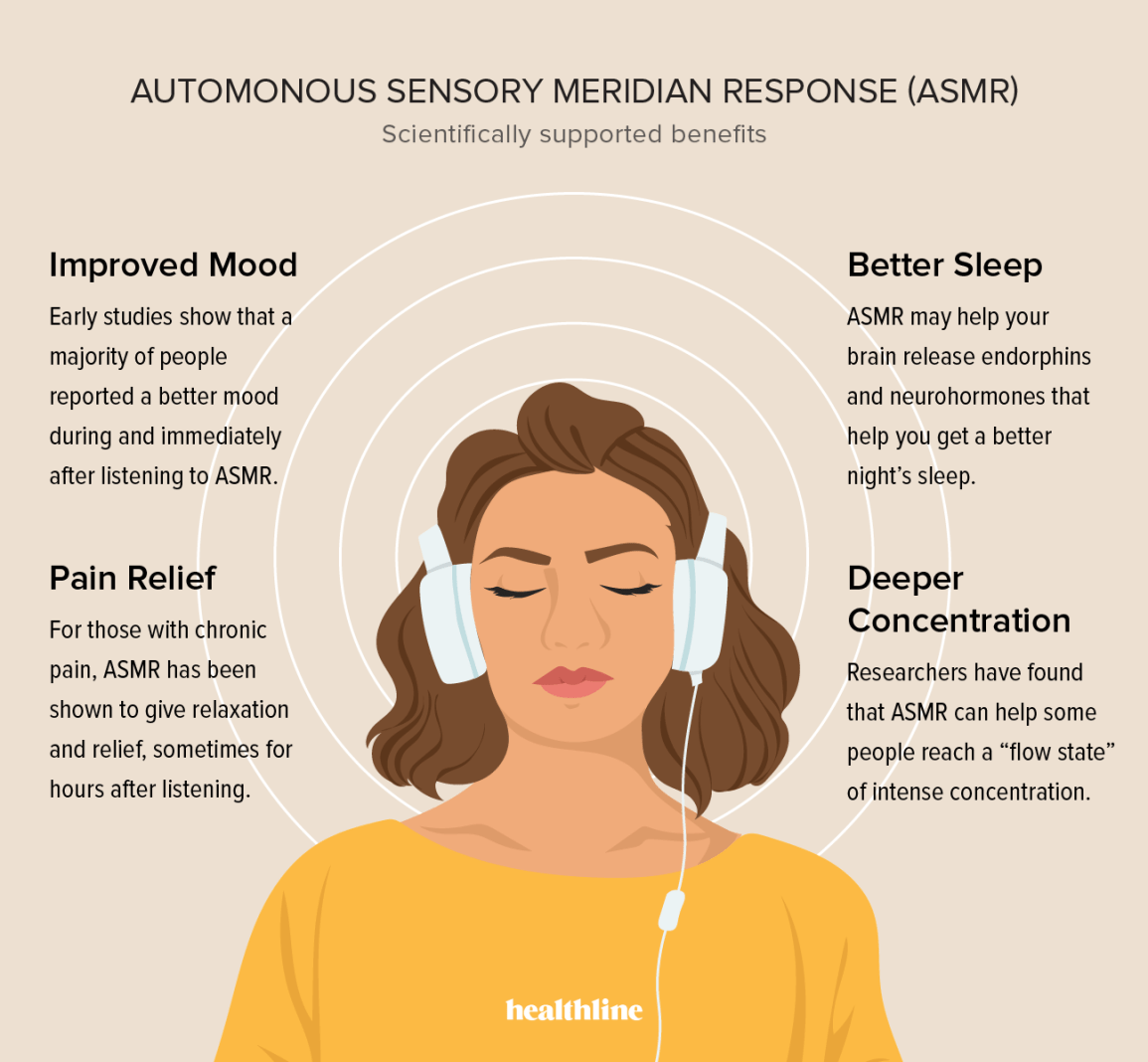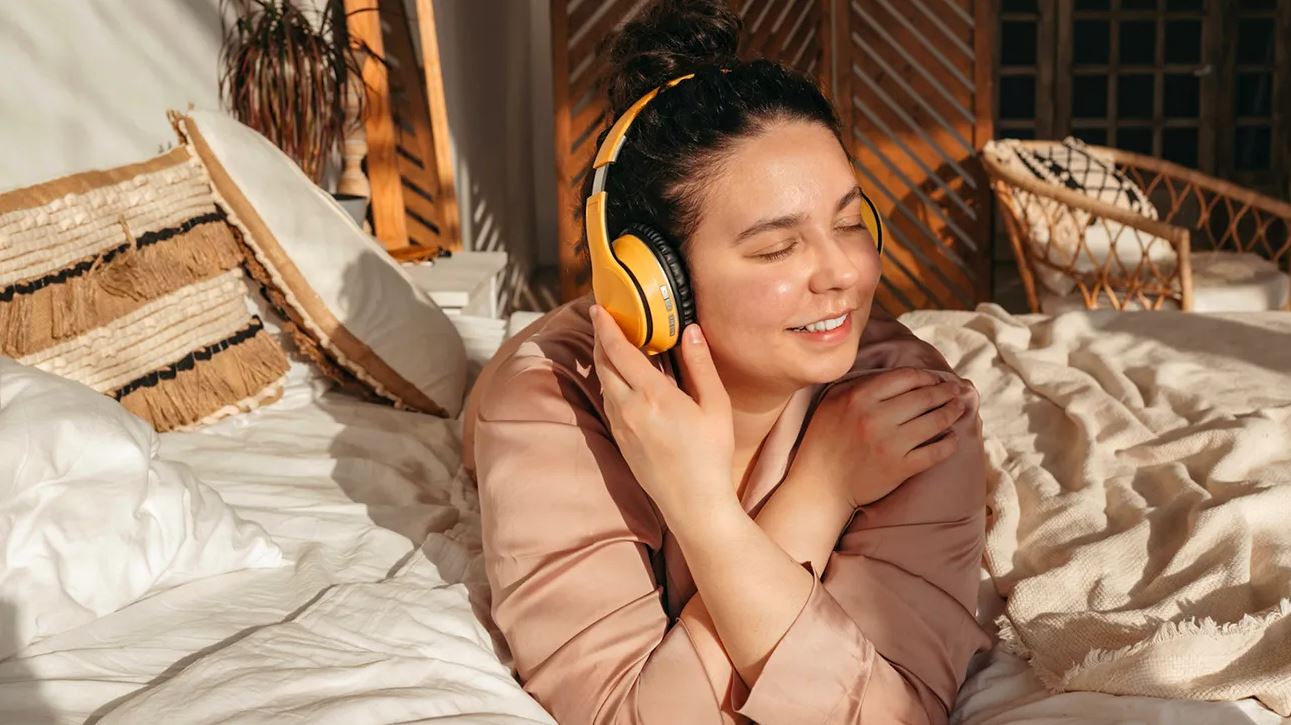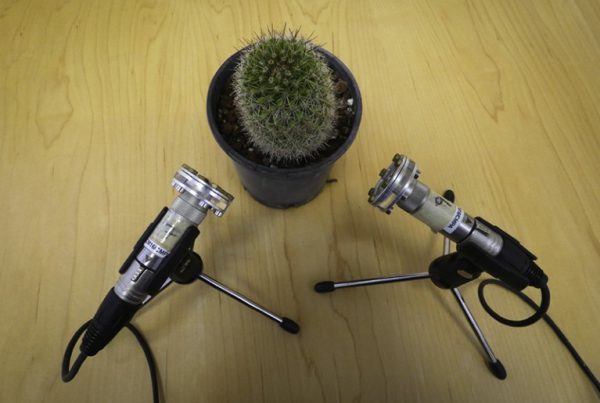If you’ve browsed YouTube or Instagram in the last several years, you’ve probably run into a multitude of videos labeled “ASMR.” What does this mean exactly?
Whether it’s whispering, tapping, or scratching, something about the sounds or visuals in ASMR clips may make your senses tingle.
Here’s what you need to know about the autonomous sensory meridian response, how the practice came to be, and how you might use this social media phenomenon to your advantage for various health issues.
ASMR stands for “autonomous sensory meridian response.” It describes the sensation you may get from certain stimuli including sounds, visuals, or even close contact with another person (whether in person or online).
People who experience ASMR say it feels like a tingling that starts on the head and moves down the back of the neck and sometimes to the rest of the body.
Other people describe it as a calm feeling that washes over their bodies starting on the scalp and moving downward.
Researcher Dr. Giulia PoerioTrusted Source explains that the following audiovisual stimuli (also known as triggers) may produce ASMR:
- whispering or speaking softly
- tapping, scratching, or crinkling sounds
- slow hand movements
- repetitive tasks
- close personal attention
The idea of ASMR has been around a long time, though it wasn’t always describes as such. Poerio explainsTrusted Source that the phenomenon may have been described in classic literature by Sylvia Plath, Virginia Woolf, and others.
Our current understanding of ASMR came about in 2007, when people in an online forum began discussing their experiences.
It wasn’t until 2010 when YouTuber Jennifer Allen coined the term, and the whole thing really took off.
To you, ASMR is a feeling. To researchers, it has something to do with how your brain responds to certain stimuli.
In one small 2018 studyTrusted Source, 10 participants had their brains imaged in an fMRI machine while viewing ASMR videos to see what was actually going on. When the participants felt the classic tingling sensation, their brains showed activity in the areas that control emotion and empathy as well as areas associated with social engagement and related activities (grooming, for example).
Beyond that, the researchersTrusted Source suggest that ASMR may cause the brain to release certain neurohormones. They explain that people report feeling sleepy, comforted, and relaxed with ASMR and that the neurohormones dopamine, oxytocin, and endorphins are closely associated with these feelings.

The research on ASMR is relatively new. Still, between anecdotal reports and beginning research, it’s starting to be clear ASMR has some benefits:
- Immediate pleasure. For people who experience the ASMR shivers and tingles, it can be a very pleasurable and relaxing feeling that happens almost immediately with exposure to the stimuli.
- Improved mood. An early study revealed that 80 percentTrusted Source of participants had improved mood after exposure to ASMR. The benefits declined faster in people with higher levels of depression.
- Pain relief. The same studyTrusted Source showed that a portion of people who deal with chronic pain found relief that lasted for up to 3 hours after exposure.
- Deeper concentration. A “flow state” refers to when you lose yourself or your sense of time because you’re so deeply concentrated on something. ResearchersTrusted Source have found similarities between ASMR and the type of focus you’d experience in flow.
- Better sleep. Early research has shown that ASMR may help get you and your brain into the right state for deep, healthy sleep by promoting relaxation and theta brainwaves.
- Other benefits. People who enjoy ASMR often report reduced anxiety, fewer headaches, lower blood pressure, and more. While these are in line with what has been proven, more research is needed to back up these claims.
Best of all, it’s accessible to almost anyone. So, if these benefits sound promising to you, you can try it for free online and without a prescription.
Not everyone enjoys or benefits from ASMR. In fact, some people reportTrusted Source experiencing stress and even sadness with stimuli. Some people feel nothing at all.
And while not harmful, some people reportTrusted Source “ASMR immunity” if they watch too many videos. This means that they have become accustomed to the stimuli, and they no longer produce that tingling sensation.
As ASMR has gained more attention, researchers have started looking into its potential use for different conditions.
Does ASMR help with ADHD symptoms?
Attention deficit hyperactivity disorder (ADHD) is characterized by difficulty maintaining attention, impulsive behavior, and hyperactivity. ResearchTrusted Source has shown that meditation or mindfulness exercises may help with maintaining attention.
This is also a popular genre for ASMR content, with plenty of channels devoted to helping people with ADHD. But there isn’t currently any dedicated research on it.
StudiesTrusted Source have suggested that ASMR may enhance flow state (concentration), so there’s a possibility that it may help some people who have trouble focusing.
Does ASMR help autistic people?
It can. Researchers have looked at ASMR as a potential therapy for autistic people. They found that it may help with anxiety and stress as they relate to emotional self-regulation.
ASMR may also help with calming and soothing after a meltdown or period of overstimulation.
That said, some autistic people may deal with overstimulation from sounds (misophonia) or even a fear of sounds (phonophobia). In these cases, ASMR may be more harmful than helpful.
Videos that rely on visual stimuli for the calming effect may be a good substitute for videos that rely on auditory stimuli in these cases.
Can ASMR help you sleep?
ASMR is associated with feelings of relaxation and calm, so it’s only natural to expect that it may help people with sleep issues.
Beginning research in this area shows that ASMR may induce the brain signals (brain waves) that are needed for sleep while keeping a person relaxed and receptive to rest.
In one 2015 studyTrusted Source, researchers surveyed people about their use of ASMR, andsleep came up for a whopping 82 percent of participants. And while more study is needed, anecdotal evidence also suggests that it may indeed help you drift off to dreamland.
Can ASMR help with headaches?
The most commonTrusted Source type of headache is the tension headache. As the name implies, tension headaches are caused by stress or tight muscles in the head and neck.
While various studiesTrusted Source mention that ASMR may help with headaches, there isn’t yet a dedicated study that looks at the direct relationship between them.
For now, consider drinking a tall glass of water, trying over-the-counter pain relievers, and then switching on an ASMR video to see if it helps.
Can ASMR help with anxiety?
ASMR may or may not help with anxiety. First, it depends on whether a person feels good or bad after viewing or listening to the audiovisual stimuli.
For those who do have a pleasurable response to ASMR, research suggests it may slow the heart rate by as much as 3.41 beatsTrusted Source per minute and promote a sense of calm.
It may also increaseTrusted Source a person’s feeling of connection to others and, therefore, feeling of well-being and bonding.
You can find millions of ASMR videos on the internet.
Should you dive in? Maybe. Here are the answers to a few commonly asked questions before you get started.
How did ASMR become a sensation?
As discussed by researcher PoerioTrusted Source, ASMR started gaining some interest in the mid-2000s.
By 2009, a YouTube user named WhisperingLife started creating whisper videos because she herself found that listening to people whisper was relaxing.
In 2011, a subreddit forum called “ASMR: Sounds that feel good” was created that continued to draw more fans of the genre.
Fast forward to 2016, and WhisperingLife had well over half a million subscribers and 15 million video views. More channels had popped up during this time and moved well beyond whispering to whole buffets of audiovisual stimuli intended to give people the tingles.
It has continued to build in popularity ever since.
Why do some people cringe at ASMR?
Not everyone has a pleasant experience with ASMR. For some, sounds may be irritating or stressful. For others, they may have no effect at all.
Some people may cringe at ASMR because they have misophonia, which means “hatred of sound” and can be triggered by the same sounds that elicit pleasure in others. Whereas ASMR makes some people feel warm and fuzzy, misophonia may produce an unsettling fight, flight, or freeze response in others.
Why does ASMR make me happy?
Certain sounds or other stimuli may activate parts of the brain that bring about strong feelings of emotion and empathy. ResearchTrusted Source has also shown that ASMR may cause the brain to release hormones that make you feel good.
Once you get in a loop of watching ASMR and you feel good, it may become a habit that you have positive associations with.
Does ASMR work on everyone?
No, some people feel nothing when exposed to ASMR stimuli. Others may experience unpleasant sensations or feelings of stress or sadness.
It may take some experimentation to see if it works for you. And some people may like visual videos better than ones that rely on sounds.
Can you be addicted to ASMR?
You can get too much of a good thing, but watching too many ASMR videos won’t necessarily harm you.
If it starts to interfere with your everyday life or you feel dependent on ASMR to function, you may want to contact your doctor or therapist to see if there are other issues at play.
It’s worth mentioning again that people who watch too much ASMR or who have developed a problem with their relationship to ASMR may be more likely to become desensitized and develop “ASMR immunity.”
ASMR stands for “autonomous sensory meridian response” and describes the tingling sensation some people get to certain stimuli.
It has become incredibly popular in the online community over the last few years. While research is still new, early studies have shown mild to moderate benefits for concentration, sleep, and overall mood.
If you’re curious about how these videos may affect you, give them a try. You may feel those delightful tingling sensations right away. Or not.
It’s an individual experience, and more research is needed to assess the true benefits beyond entertainment purposes.
Source: Autonomous Sensory Meridian Response (ASMR): Science & History













